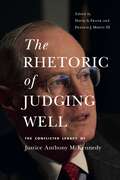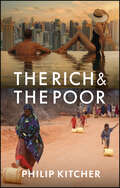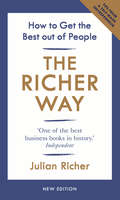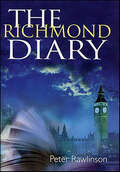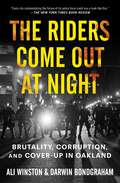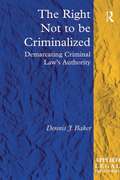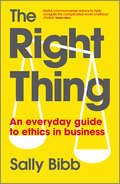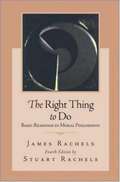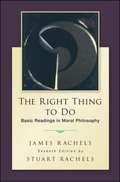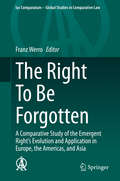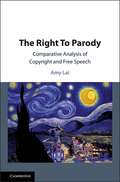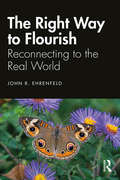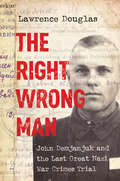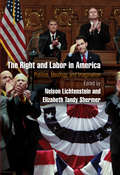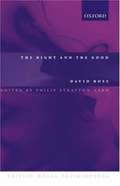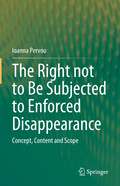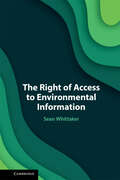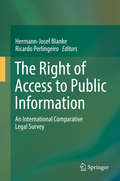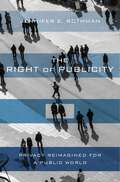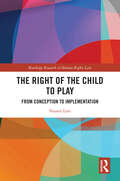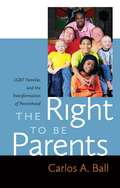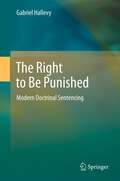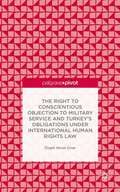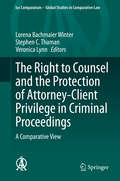- Table View
- List View
The Rhetoric of Judging Well: The Conflicted Legacy of Justice Anthony M. Kennedy (Rhetoric and Democratic Deliberation)
by David A. Frank And Francis J. Mootz IIIKnown as the “swing justice,” Justice Anthony M. Kennedy provided the key vote determining which way the Supreme Court would decide on some of the most controversial cases in US history. Though criticized for his unpredictable rulings, Kennedy also gained a reputation for his opinion writing and, more so, for his legal rhetoric.This book examines Justice Kennedy’s legacy through the lenses of rhetoric, linguistics, and constitutional law. Essays analyze Kennedy’s opinion writing in landmark cases such as Romer v. Evans, Obergefell v. Hodges, and Planned Parenthood v. Casey. Using the Justice’s rhetoric as an entry point into his legal philosophy, this volume reveals Kennedy as a justice with contradictions and blind spots—especially on race, women’s rights, and immigration—but also as a man of empathy deeply committed to American citizenship.A sophisticated assessment of Justice Kennedy’s jurisprudence, this book provides new insight into Kennedy’s legacy on the Court and into the role that rhetoric plays in judging and in communicating judgment.In addition to the editors, the contributors to this volume are Ashutosh Bhagwat, Elizabeth C. Britt, Martin Camper, Michael Gagarin, James A. Gardner, Eugene Garver, Leslie Gielow Jacobs, Sean Patrick O’Rourke, Susan E. Provenzano, Clarke Rountree, Leticia M. Saucedo, Darien Shanske, Kathryn Stanchi, and Rebecca E. Zietlow.
The Rich and the Poor
by Philip KitcherThe Rich and the Poor is part chronicle, part analysis of a disturbing sea-change: the abandonment of ethics in public policy. Seventy years ago, it was possible for serious thinkers, including some in the governments of affluent nations, to consider policies for raising living standards worldwide. Today, by contrast, the principal policy questions revolve around how to stay on top in a dog-eat-dog world. Philip Kitcher, one of the world’s most eminent philosophers, offers a new account of how ethics and politics should mix. The world needs to explore and reprioritize ethical questions, through inclusive deliberation that is both factually informed and mutually engaged with other perspectives. Achieving that end is hard, but without aspiring to it, we are likely to condemn our successors to lives of great hardship. Climate change demands global cooperation of a kind that can only be obtained by returning to ethical inquiry. The divorce between ethics and economics threatens disaster for all.
The Richer Way: How to Get the Best Out of People
by Julian RicherIn 1978 Julian Richer, then aged just nineteen, opened his first shop near London Bridge. For over twenty years this shop has been listed in the Guinness Book of Records as having the highest sales per square foot of any retail outlet in the world, and the company as a whole, with its fifty-three stores nationwide and huge online presence, has become Britain’s favourite retailer of TV and hi-fi equipment. What lies behind this extraordinary success?For Julian, the answer is simple: throughout his career he has focussed relentlessly on putting people – both staff and customers – right at the centre of his business. And in The Richer Way, he offers a supremely practical guide to how others can follow suit. He explains how to motivate employees and measure their progress. He establishes how to balance company discipline with individual autonomy. He explores what ‘customer service’ should really involve. Above all, he points the way to creating an open, friendly and flexible culture that will not only attract the best people but also offer the greatest chance of business success. Packed with straightforward, common-sense advice, The Richer Way will prove essential reading for all organisations, whatever their nature and size.
The Richmond Diary
by Peter RawlinsonWhen aesthete and society snob Francis Richmond died, he believed that no one would ever remember him. But he left behind him a diary, and when his heir, a young out- of-work actor, comes across it, he takes it to the newspapers. Digby Price, owner of News Universal, wants revenge. He wants to destroy the Minister for Defence Procurement, Richard Tancred - and Richmond's diary tells of Tancred's involvement with a millionaire industrialist. Price publishes. Tancred sues. As Price's council, Mordecai Ledbury QC prepares to meet his thrusting young opponent Patrick Foxley in the libel court, the industrialist commits suicide. Tancred's fate seems sealed.But Tancred is planing his own courtroom exposure. What he has to reveal is more tragic than the political shame Richmond thought he had stumbled across. Impossible to put down, this is brilliant courtroom drama with a plot that moves like clockwork and an ending that has a real sting in its tail.
The Riders Come Out at Night: Brutality, Corruption, and Cover-up in Oakland
by Ali Winston Darwin BondGrahamFrom the Polk Award–winning investigative duo comes a critical look at the systematic corruption and brutality within the Oakland Police Department, and the more than two-decades-long saga of attempted reforms and explosive scandals.No municipality has been under court oversight to reform its police department as long as the city of Oakland. It is, quite simply, the edge case in American law enforcement. The Riders Come Out at Night is the culmination of over twenty-one years of fearless reporting. Ali Winston and Darwin BondGraham shine a light on the jackbooted police culture, lack of political will, and misguided leadership that have conspired to stymie meaningful reform. The authors trace the history of Oakland since its inception through the lens of the city&’s police department, through the Palmer Raids, McCarthyism, and the Civil Rights struggle, the Black Panthers and crack eras, to Oakland&’s present-day revival. Readers will be introduced to a group of sadistic cops known as &“The Riders,&” whose disregard for the oath they took to protect and serve is on full, tragic, infuriating display. They will also meet Keith Batt, a wide-eyed rookie cop turned whistleblower, who was unwittingly partnered with the leader of the Riders. Other compelling characters include Jim Chanin and John Burris, two civil rights attorneys determined to see reform through, in spite of all obstacles. And Oakland&’s deep history of law enforcement corruption, reactionary politics, and social movement organizing is retold through historical figures like Black Panther Huey Newton, drug kingpin Felix Mitchell, district attorney and future Supreme Court Justice Earl Warren, and Mayor Jerry Brown. The Riders Come Out at Night is the story of one city and its police department, but it&’s also the story of American policing—and where it&’s headed.
The Right Not to be Criminalized: Demarcating Criminal Law's Authority (Applied Legal Philosophy)
by Dennis J. BakerThis book presents arguments and proposals for constraining criminalization, with a focus on the legal limits of the criminal law. The book approaches the issue by showing how the moral criteria for constraining unjust criminalization can and has been incorporated into constitutional human rights and thus provides a legal right not to be unfairly criminalized. The book sets out the constitutional limits of the substantive criminal law. As far as specific constitutional rights operate to protect specific freedoms, for example, free speech, freedom of religion, privacy, etc, the right not to be criminalized has proved to be a rather powerful justice constraint in the U.S. Yet the general right not to be criminalized has not been fully embraced in either the U.S. or Europe, although it does exist. This volume lays out the legal foundations of that right and the criteria for determining when the state might override it. The book will be of interest to researchers in the areas of legal philosophy, criminal law, constitutional law, and criminology.
The Right Thing
by Sally BibbTrust in business is at an all-time low, but more people than ever claim that working for an ethical company matters to them. Something has to change. But in a everyday working environment, ethics often seem abstract and hard to grasp. The Right Thing is here to help, as leading business consultant Sally Bibb gives you simple steps to make sure that you're working ethically. The book features:Simple explanations of big ethical ideasCase studies to bring ethics to life, and show how bad it can be when ethics go wrongTips on everything from ethical leadership to creating an ethical cultureChecklists - so you can make sure you're doing the right thing
The Right Thing To Do: Basic Readings in Moral Philosophy
by Stuart Rachels James RachelsThis collection of readings in moral theory and moral issues from major Western philosophers is the ideal companion reader for James Rachels' text The Elements of Moral Philosophy. The anthology explores further the theories and issues introduced in that volume, in their original and classic formulations. The collection can stand on its own as the text for a course in moral philosophy, or it can be used to supplement any introductory text.
The Right Thing To Do: Basic Readings in Moral Philosophy 7th Edition
by Stuart Rachels James RachelsThe Right Thing to Do: Basic Readings in Moral Philosophy is a companion reader to the best-selling text: The Elements of Moral Philosophy (0-07-8119065). Authors James Rachels and Stuart Rachels offer engaging, thought-provoking essays on compelling issues that students are familiar with and understand. This rich collection of essays can be used on its own for a course on moral philosophy, or it can be used to supplement other introductory texts.
The Right To Be Forgotten: A Comparative Study of the Emergent Right's Evolution and Application in Europe, the Americas, and Asia (Ius Comparatum - Global Studies in Comparative Law #40)
by Franz WerroThis book examines the right to be forgotten and finds that this right enjoys recognition mostly in jurisdictions where privacy interests impose limits on freedom of expression. According to its traditional understanding, this right gives individuals the possibility to preclude the media from revealing personal facts that are no longer newsworthy, at least where no other interest prevails. Cases sanctioning this understanding still abound in a number of countries. In today’s world, however, the right to be forgotten has evolved, and it appears in a more multi-faceted way. It can involve for instance also the right to access, control and even erase personal data. Of course, these prerogatives depend on various factors and competing interests, of both private and public nature, which again require careful balancing. Due to ongoing technological evolution, it is likely that the right to be forgotten in some of its new manifestations will become increasingly relevant in our societies.
The Right To Parody: Comparative Analysis of Copyright and Free Speech
by Amy LaiIn The Right to Parody: Comparative Analysis of Free and Fair Speech, Amy Lai examines the right to parody as a natural right in free speech and copyright, proposes a legal definition of parody that respects the interests of rights holders and accommodates the public's right to free expression, and describes mechanisms to ensure that parody will best serve this purpose. Combining philosophical inquiry with robust legal analysis, the book draws upon examples from the United States, Canada, the United Kingdom, France, and Hong Kong. While it caters to scholars in intellectual property and constitutional law, as well as free speech advocates, it is written in a non-specialist language designed to appeal to any reader interested in how the boom in online parodies and memes relates to free speech and copyright.
The Right To Private Property
by Jeremy WaldronPresenting a comprehensive, critical examination of the claim that private property is one of the fundamental rights of humankind, Waldron here contrasts two types of arguments about rights: those based on historical entitlement, and those based on the importance of property for freedom. He illustrates this contrast with a detailed discussion of the theories of property found in Locke's Second Treatise and Hegel's Philosophy of Rights, and offers original analyses of the concept of ownership, the idea of rights, and the relation between property and equality, finding that traditional arguments about property yield some surprisingly radical conclusions.
The Right Way to Flourish: Reconnecting to the Real World
by John EhrenfeldIn this ground-breaking book, pre-eminent thought leader in the fields of sustainability and flourishing, John R. Ehrenfeld, critiques the concept of sustainability as it is understood today and which is coming more and more under attack as unclear and ineffective as a call for action. Building upon the recent work of cognitive scientist, Iain McGilchrist, who argues that the human brain’s two hemispheres present distinct different worlds, this book articulates how society must replace the current foundational left-brain-based beliefs – a mechanistic world and a human driven by self interest – with new ones based on complexity and care. Flourishing should replace the lifeless metrics now being used to guide business and government, as well as individuals. Until we accept that our modern belief structure is, itself, the barrier, we will continue to be mired in an endless succession of unsolved problems.
The Right Wrong Man
by Lawrence DouglasIn 2009, Harper's Magazine sent war-crimes expert Lawrence Douglas to Munich to cover the last chapter of the lengthiest case ever to arise from the Holocaust: the trial of eighty-nine-year-old John Demjanjuk. Demjanjuk's legal odyssey began in 1975, when American investigators received evidence alleging that the Cleveland autoworker and naturalized US citizen had collaborated in Nazi genocide. In the years that followed, Demjanjuk was twice stripped of his American citizenship and sentenced to death by a Jerusalem court as "Ivan the Terrible" of Treblinka--only to be cleared in one of the most notorious cases of mistaken identity in legal history. Finally, in 2011, after eighteen months of trial, a court in Munich convicted the native Ukrainian of assisting Hitler's SS in the murder of 28,060 Jews at Sobibor, a death camp in eastern Poland. An award-winning novelist as well as legal scholar, Douglas offers a compulsively readable history of Demjanjuk's bizarre case. The Right Wrong Man is both a gripping eyewitness account of the last major Holocaust trial to galvanize world attention and a vital meditation on the law's effort to bring legal closure to the most horrific chapter in modern history.
The Right and Labor in America: Politics, Ideology, and Imagination
by Nelson Lichtenstein Elizabeth Tandy ShermerThe legislative attack on public sector unionism that gave rise to the uproar in Wisconsin and other union strongholds in 2011 was not just a reaction to the contemporary economic difficulties faced by the government. Rather, it was the result of a longstanding political and ideological hostility to the very idea of trade unionism put forward by a conservative movement whose roots go as far back as the Haymarket Riot of 1886. The controversy in Madison and other state capitals reveals that labor's status and power has always been at the core of American conservatism, today as well as a century ago.The Right and Labor in America explores the multifaceted history and range of conservative hostility toward unionism, opening the door to a fascinating set of individuals, movements, and institutions that help explain why, in much of the popular imagination, union leaders are always "bosses" and trade union organizers are nothing short of "thugs." The contributors to this volume explore conservative thought about unions, in particular the ideological impulses, rhetorical strategies, and political efforts that conservatives have deployed to challenge unions as a force in U.S. economic and political life over the century. Among the many contemporary books on American parties, personalities, and elections that try to explain why political disputes are so divisive, this collection of original and innovative essays is essential reading.
The Right and the Good
by Philip Stratton-Lake W. D. RossThe Right and the Good, a classic of twentieth-century philosophy by the eminent scholar Sir David Ross, is now presented in a new edition with a substantial introduction by Philip Stratton-Lake, a leading expert on Ross. Ross's book is the pinnacle of ethical intuitionism, which was the dominant moral theory in British philosophy for much of the nineteenth and early twentieth century. Intuitionism is now enjoying a considerable revival, and Stratton-Lake provides the context for a proper understanding of Ross's great work today.
The Right not to Be Subjected to Enforced Disappearance: Concept, Content and Scope
by Ioanna PervouThis book offers a distinctive approach to the right not to be subjected to enforced disappearance. Over the last decade, the entry into force of the UN Convention for the Protection of All Persons from Enforced Disappearance has brought to the forefront of legal discussion the need to effectively address the practice of disappearance. Yet, there are still obstacles to combatting it, which are in part due to a limited understanding of the right’s underlying concept, content and scope.This book examines the phenomenon and definition of enforced disappearance and sheds new light on the right against disappearance. Presenting a doctrinal appraisal of the norm’s legal value, it suggests that the right against enforced disappearance holds a customary value, while also arguing that it has since attained a jus cogens status. Lastly, it examines in detail the rights to truth and reparation and how regional and national courts have interpreted these norms. It assesses the UN Convention’s dynamics and considers whether the lack of a right against disappearance embedded in regional human rights systems affects individuals’ protection.The book provides an overview of key jurisprudence on disappearances, making it of benefit to both practitioners and theorists of international law.
The Right of Access to Environmental Information
by Sean WhittakerThe book discusses the normative impact of the Aarhus Convention on how England, America and China guarantees the right of access to environmental information. Through this analysis the book identifies each of these jurisdictions' unique conceptualisations of the right which, in turn, influences the design of their respective environmental information regimes. This allows these jurisdictions potentially to act as sources of legal reforms for each other to improve how the right is guaranteed via legal transplant theory, challenging the normativity of the Aarhus Convention. This is not to suggest that the Aarhus Convention exerts no normative influence on how the right is guaranteed; there are core substantive and core procedural elements which have to be met for the right to be effectively guaranteed, and the book shows that the Aarhus Convention does exert a normative influence over the procedural elements of the right.
The Right of Access to Public Information: An International Comparative Legal Survey
by Hermann-Josef Blanke Ricardo PerlingeiroThis book presents a comparative study on access to public information in the context of the main legal orders worldwide(inter alia China,France,Germany,Japan,Russia,Sweden,United States).The international team of authors analyzes the Transparency- and Freedom-to-Information legislation with regard to the scope of the right to access, limitations of this right inherent in the respective national laws, the procedure, the relationship with domestic legislation on administrative procedure, as well as judicial protection. It particularly focuses on the Brazilian law establishing the right of access to information, which is interpreted as a benchmark for regulations in other Latin-American states.
The Right of Publicity: Privacy Reimagined for a Public World
by Jennifer E. RothmanWho controls how one’s identity is used by others? This legal question, centuries old, demands greater scrutiny in the Internet age. Jennifer Rothman uses the right of publicity—a little-known law, often wielded by celebrities—to answer that question, not just for the famous but for everyone. In challenging the conventional story of the right of publicity’s emergence, development, and justifications, Rothman shows how it transformed people into intellectual property, leading to a bizarre world in which you can lose ownership of your own identity. This shift and the right’s subsequent expansion undermine individual liberty and privacy, restrict free speech, and suppress artistic works. The Right of Publicity traces the right’s origins back to the emergence of the right of privacy in the late 1800s. The central impetus for the adoption of privacy laws was to protect people from “wrongful publicity.” This privacy-based protection was not limited to anonymous private citizens but applied to famous actors, athletes, and politicians. Beginning in the 1950s, the right transformed into a fully transferable intellectual property right, generating a host of legal disputes, from control of dead celebrities like Prince, to the use of student athletes’ images by the NCAA, to lawsuits by users of Facebook and victims of revenge porn. The right of publicity has lost its way. Rothman proposes returning the right to its origins and in the process reclaiming privacy for a public world.
The Right of the Child to Play: From Conception to Implementation (Routledge Research in Human Rights Law)
by Naomi LottThis book provides a vital and original investigation into, and critique of, the situation facing the realisation of the child’s right to play. The right to play has been referred to as a forgotten right – forgotten by States implementing the Convention on the Rights of the Child, by the Committee on the Rights of the Child in monitoring and providing guidance on the Convention, and by human rights academics. Through multidisciplinary, original archival, novel doctrinal and primary empirical research, the work provides a thorough investigation of the right to play. It offers an innovative insight into its value, the challenges facing the realisation of the right, its raison d’être and its scope, content and obligations. It also critiques the Committee’s engagement with the right to play and shares lived experiences of efforts to support its implementation in the United Kingdom and Tanzania. The book highlights elements of best practice, challenges, and weaknesses, and makes recommendations for the continued and improved realisation of the right to play. The book will be a valuable resource for researchers, academics, advocates and policy-makers working in the areas of Children’s Rights, International Human Rights Law, Public International Law, Child Welfare, and Education.
The Right to Be Parents: LGBT Families and the Transformation of Parenthood
by Carlos A. BallThe Right to beParents is the first book to provide a detailed history of how LGBT parentshave turned to the courts to protect and defend their relationships with theirchildren. Carlos A. Ball chronicles the stories of LGBT parents who, in seekingto gain legal recognition of and protection for their relationships with theirchildren, have fundamentally changed how American law defines and regulatesparenthood. To this day, some courts are still not able to look beyond sexualorientation and gender identity in cases involving LGBT parents and theirchildren. Yet on the whole, Ball’s stories are of progress and transformation:as a result of these pioneering LGBT parent litigants, the law is increasinglyrecognizing the wide diversity in American familial structures.
The Right to Be Punished
by Gabriel HallevyDoes an offender have the right to be punished? "The right to be punished" may sound like an oxymoron, but it is not necessarily so. With the emergence of modern criminal law, the offender gained the right to be punished by rational criminal law rather than being lynched by an angry mob. The present-day offender may have the right to be punished by doctrinal sentencing rather than being subjected to verdicts based on vague, unclear, and uncertain principles. In modern criminal law, the imposition of criminal liability follows accurate and strict rules, whereas there are no similar rules for the imposition of punishment. The process of sentencing is vague and obscure, as are the considerations used for the imposition of punishments. The objective of the present book is to propose a comprehensive, general, and legally sophisticated theory of modern doctrinal sentencing. The challenges of such a legal theory are plenty and complex. In addition to increasing clarity and certainty, modern doctrinal sentencing must deal with modern types of delinquency (e.g. organized crime, recidivism, corporate offenders, high-tech offenses, etc.) and modern principles of criminal law. Modern doctrinal sentencing must serve to ensure optimal sentencing.
The Right to Conscientious Objection to Military Service and Turkey’s Obligations under International Human Rights Law (Palgrave Pivot)
by Özgür Heval ҪinarThis study examines Turkey's non-recognition of the right to conscientious objection to military service and locates this non-recognition within the context of international human rights law - specifically United Nations and European Union system.
The Right to Counsel and the Protection of Attorney-Client Privilege in Criminal Proceedings: A Comparative View (Ius Comparatum - Global Studies in Comparative Law #44)
by Stephen C. Thaman Lorena Bachmaier Winter Veronica LynnThe book provides an overview of the right to counsel and the attorney-client privilege in the following 12 jurisdictions: China, Germany, Greece, Italy, Japan, the Netherlands, Portugal, Spain, Switzerland, Turkey, UK and USA.The right to counsel is a fundamental right providing the accused access to justice in criminal proceedings. Lawyers can only practice their profession properly if clients have complete trust in their lawyer’s discretion. This trust is safeguarded by the attorney-client privilege, which is an indispensable part of every constitutional state and one of the most important professional duties of a lawyer. It is of particular importance in criminal proceedings regarding the protection of the confidentiality of lawyer-client communications in the different procedural stages, coercive measures as well as the various duties and interests in play. However, the communications protected by attorney-client privilege vary greatly from country to country. With regard to criminal investigations in an increasingly globalised world, where sophisticated tools enable broad digital investigations, there is an urgent need to clarify how this fundamental right is protected at both the national and supranational level. Each chapter explores the regulations, practices and recent developments in each jurisdiction and was written by highly qualified experts in the legal field – from academia and practice alike. It identifies possible solutions and best practices, providing valuable insights for practitioners and law-making bodies alike regarding the actual protection (or lack thereof) of lawyer-client confidentiality in the pretrial and trial stage of criminal proceedings.
